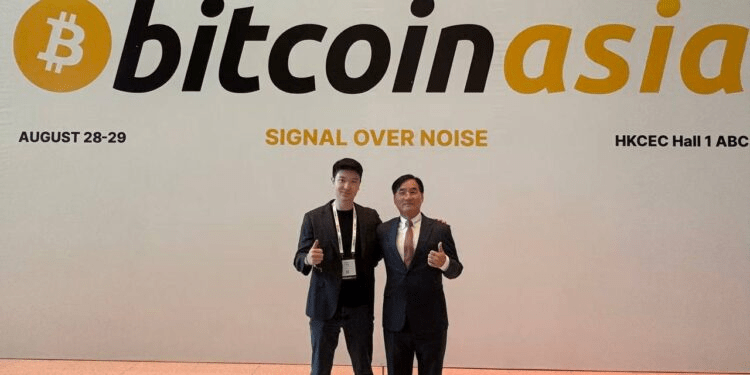
At the board meeting on August 8, 2025, Zhitong Technology (8932) made a key decision to adopt a Bitcoin reserve strategy and established a partnership with the international digital asset investment institution Top Win International Limited (SORA). This makes Zhitong the first listed company in Taiwan to implement a Bitcoin capital strategy, marking its transition from a traditional technology company to a new transformation in blockchain and fintech.
Chain News conducted an exclusive interview with Zhitong Technology. Zhitong's General Manager Cai Kunhuang stated that this initiative continues the company's business philosophy of 'advancing with the times.' He emphasized: 'As the first listed company in Taiwan to adopt a Bitcoin reserve strategy, this not only resonates with Zhitong's consistent philosophy of progressing with the times but also represents a crucial step for us in transitioning from a traditional technology company to a new chapter in blockchain and fintech. We believe that digital assets will become an important engine driving Zhitong's growth and enhancing international competitiveness.'
Strategic motivations: From asset preservation to capital market effects
Zhitong views Bitcoin as a part of corporate asset allocation, driven by three key motivations. First is the scarcity of Bitcoin; the total supply cap of 21 million gives it the characteristics of inflation resistance and protection against fiat currency depreciation. Second, Zhitong's business spans multiple currency markets, and Bitcoin can serve as a currency hedging tool to reduce risks from currency fluctuations. Finally, Bitcoin has a 'valuation leverage' effect in the capital market; the company expects to amplify NAV and EPS through investments related to Bitcoin reserves, further enhancing shareholder value.
Investment tool design: A convertible bond that balances offense and defense
Unlike direct purchases of coins, Zhitong chose to enter the Bitcoin strategy through the issuance of a $2 million three-year convertible note issued by SORA. The company pointed out that this is a design that balances offense and defense.
When the market is up, participate in capital appreciation through conversion of shares
When the market is down, retain debt protection and continue to enjoy a fixed interest rate of 3%
Such arrangements not only ensure the company can participate in the upside of Bitcoin capital strategies but also effectively manage risks and protect investor interests.
Collaboration with SORA: Compliance first, gradual implementation
Zhitong emphasizes that the key to collaborating with SORA lies in its accumulated compliance experience in markets like Japan, Hong Kong, and South Korea. Since Taiwan's current accounting standards and regulatory stance on listed companies directly holding Bitcoin are still unclear, Zhitong chooses to participate indirectly through SORA's framework and absorb its compliance and accounting processing models. In the future, when IFRS (International Financial Reporting Standards Foundation) and Taiwan's policies become clearer, the company will consider directly incorporating Bitcoin into its balance sheet.
Compared to the direct purchase of coins from Dafeng Electric, Zhitong's differentiated strategy is more gradual, highlighting the principle of 'compliance first, protecting shareholders.'
Business integration: New momentum in payments and cross-border finance
Zhitong states that the Bitcoin strategy is not only an asset-level layout but also plans to integrate with its FinShell Pay platform and future payment business. Future developments are not ruled out.
Bitcoin and stablecoin payments
Small loans collateralized by crypto assets (combined with Indian NBFC license)
Cross-border settlement services to reduce costs and enhance efficiency
Notably, Zhitong has completed the acquisition of India’s Letul Investments Private Limited and obtained an NBFC license, laying the foundation for expanding international digital financial services. This will enable the company to promote the deep integration of Bitcoin and fintech applications in the global market.
Market response and shareholder feedback
After the announcement was released, Zhitong's stock price and trading volume strengthened simultaneously, reflecting the market's high recognition of the new strategy. Zhitong stated that major shareholders also gave positive feedback, believing that this move will bring new growth stories to Zhitong and attract more international investors' attention.
Some viewpoints suggest that if Bitcoin maintains a bullish trend, Zhitong's layout may bring continuous support effects to the stock price, even leading Taiwanese listed companies into a new era of 'Bitcoinization.'
Risk management: Long-term holding and financial hedging
In response to external concerns about volatility risks, Zhitong has proposed multiple defenses, including phased entry to reduce single-point risks, adopting a long-term holding (HODL) strategy to avoid short-term speculation, and using financial instruments for hedging when necessary. These measures demonstrate the company's emphasis on risk management and its attitude of balancing innovation with stability.
Insights for the capital market
Zhitong's actions are seen not only as the company's own transformation but also as an important insight for Taiwan and Asia's capital markets. The company hopes to prove through its practice that Bitcoin is not only a speculative asset but can also become part of listed companies' capital strategies. This move may rewrite the narrative of corporate valuation from the traditional 'business × profitability' to 'business × digital asset reserves.'
Zhitong does not only view Bitcoin as an investment but integrates it into the company's long-term strategy, creating a new generation of 'blockchain + fintech' enterprise blueprint through asset preservation, business innovation, and international cooperation. This case may become an important milestone for Asian companies to reference, opening a new chapter for future capital markets.
$BTC $ETH $PEPE



